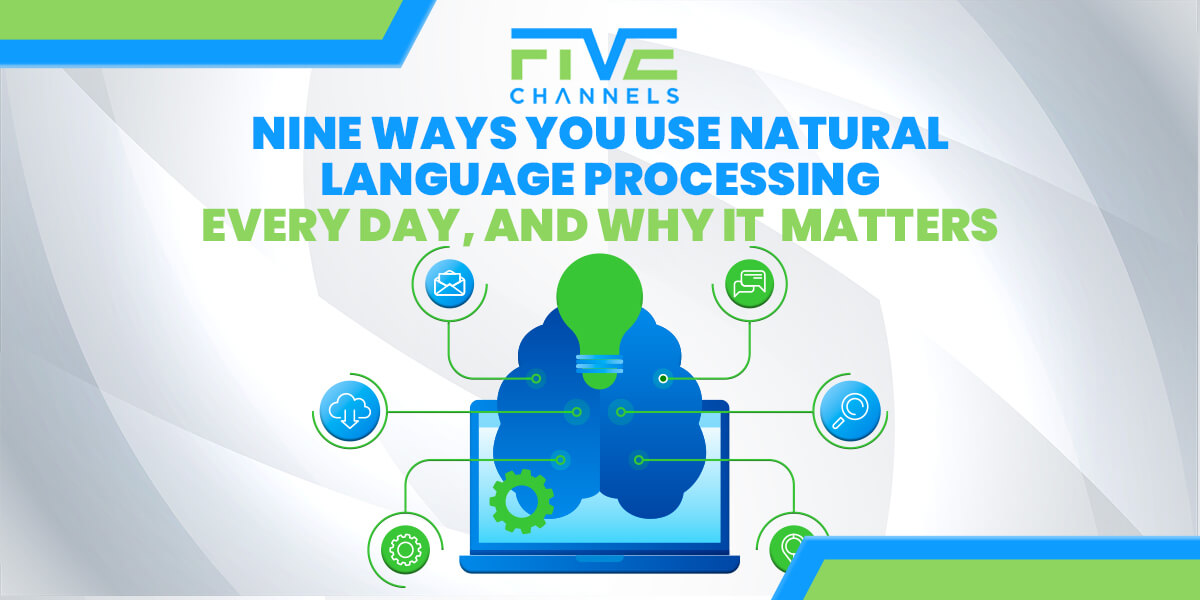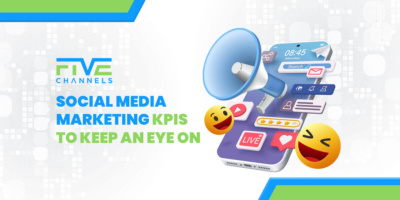Natural language processing is the way machines and technology communicate with humans. It’s become commonplace in our daily lives, and it’s also useful for increasing efficiency, especially in business.
Are you looking for quicker ways to look after your customers? More reliable ways to analyze data? Do you need to improve productivity each day?
If so, it’s likely your company can benefit from natural language processing. It’s time to learn what natural language processing means, and some of the top ways we use it in our lives.

What Exactly is Natural Language Processing?
Natural Language Processing, known as NLP, is a term to describe the way machines (such as computers and smartphones) interact with human language.
NLP makes it possible for computers to not only understand our language but to interact with us, through voice and text. It is closely linked to computer science, linguistics, and artificial intelligence, as all of these disciplines are needed to bring NLP to life.
As humans are able to pick up on context in language and respond accordingly to what another person has said, machines can now do the same. This has huge benefits for communication across both businesses and personal technology use.
It has actually been around since the 1950s when machines first began to translate other languages. However, it has continued to improve and now plays a big role in the day to day life of many people.
1. Search Autocomplete
You’ve probably already used NLP today, without even realizing it.
One of the most common natural language processing examples is search autocomplete. If you frequently use search engines, you’re probably very familiar with this feature, even if you haven’t given it much thought.
For example, if you’re on Google and start typing in ‘chi-’ it may bring up predictions of what it thinks you’re searching for, to make it easier for you.
In this case, it could be ‘Chicago’, ‘Chicago weather’, ‘Chicago Illinois’. These predictions are given to you based on what Google has figured out others like you are searching for.
Based on your location and search history, search engines like Google use NLP to make life easier, so you can find what you need faster.
Of course, we’ve all had a search suggestion that was completely off-base, so it’s not accurate 100% of the time. However, more often than not, you’ll get the results you’re looking for.
2. Spellcheck
In both business and personal life, we depend on spell checking to make sure we aren’t writing documents that contain embarrassing spelling errors.
However, how does your computer know that ‘ir’ should be ‘it’, in the context of your writing? Using natural language processing, computers have learned over time how to understand human languages, using computer science and linguistics.
Now, your computer or phone can not only tell you if a word is spelled incorrectly, but it can also tell us if we have used an incorrect word, or if we are missing a word that it thinks should be in a sentence.
Spellcheck saves us time when we communicate. We can send off important documents and edit our blog posts with confidence, knowing that spell check has improved their quality.
It’s easy to take spell check for granted, as it’s a feature we all use frequently on our phones or computers. However, the process of computers understanding language is quite complex and took years to develop and perfect.
3. Language Translation
Have you ever come across a paragraph of text in another language and used Google Translate to figure out the meaning? Have you used a language or translation app when traveling overseas?
Machine-based language translation is done by NLP. It helps us increase our understanding in an increasingly global world.
Many translation apps even work with human translators. Not to translate the actual text on each occasion, but to learn from them to improve on their own translations. Translation software, while not always completely accurate, allows us to communicate like never before.
Language translation is also an important function of NLP for business. We can also use it to communicate with clients, translate important text and documents, or to advertise to a new market.
4. Chatbots
Have you ever used a chatbot to communicate with a business? Does your business already use them to stay in touch with your clients?
Chatbots are apps that use both NLP and artificial intelligence to communicate with others, using natural language.
Setting up a chatbot system is much more cost-effective than hiring additional staff. For example, a retail store, who might do the highest number of sales during the holiday period, could consider using chatbots as part of their holiday marketing strategy.
This helps keep up with customer demand, and guarantees your customers get quick replies to their questions. You can also set up automated responses to FAQs, which can free up your customer service staff for more complex issues.
Chatbots use NLP to learn and understand what customers are asking of them so that they can answer correctly. They interact with customers and their responses are tailored to the questions asked, making them very useful.
You often see chatbots used on Facebook, What’s App, or directly on business websites. They can be useful to direct customer service inquiries or manage complaints or questions.
If you’re looking for an effective way to use NLP to improve your business, look into chatbots, and see if they can save your company both money and time.
5. Virtual Assistants
Many of us have virtual assistants, such as Siri and Alexa, in our homes, offices, and on our phones.
Virtual assistants can help businesses by managing busy schedules, helping us book meetings, and looking up information for us quickly.
If you’re using a virtual assistant to improve your efficiency, you have NLP to thank for that.
They generally work via voice, and we can activate them using a certain keyword (like ‘hey Siri). They can then perform a huge range of tasks for us, ranging from simple things like telling us the time or the weather and playing our favorite song, or help with more complicated tasks like scheduling meetings.
We can talk directly to our assistant through our devices and get answers immediately. This is all possible thanks to NLP.
Machines have been able to learn to understand our voices, language, accents, and even local slang, ensuring they can give us the correct information.
If you haven’t yet tried a virtual assistant, try setting one up to see how it can save you time. Assistants like Alexa are constantly learning new skills and information from programmers and humans to improve the delivery of their services.
6. Email Filters
How does your email inbox know which emails should be considered junk mail? How does Gmail know to automatically categorize emails as ‘Primary’ or ‘Social’?
NLP is used heavily by email providers to make filters. Email filters save us a great amount of time and frustration, as we wouldn’t be happy if spam emails started showing up in our inbox for us to sort through.
Email services can use NLP, based on the language used in the body and subject line, plus the sender, to work out how to categorize the email.
It’s an automatic filing system that saves us time and helps us prioritize the most important emails in our inbox. Instead of taking the time to sort through each email, we can focus our attention on the priority inboxes and put aside the others.
You can even use NLP to set up your own email filters if you want to automatically file certain emails in certain places. This can save time and can also be helpful if multiple staff are sharing access to an email account.
7. Predictive Texting
On our smartphones, we can use predictive text to send messages and communicate faster.
This is done in a similar way to search autocomplete, as it uses our words to work out what we want to say.
With predictive texting, we can enter a word or two of a sentence, and our smartphone will automatically work out what we are trying to type. This saves time as we no longer have to type out the entire sentence, allowing us to text much faster.
While some find it frustrating as it isn’t always correct, many people enjoy the convenience predictive texting brings. However, if it bothers you, all phones have the option to turn off this feature.
Predictive text works from machine learning. Our systems have, over time, learned to understand the syntax of language, working out what we are trying to say.
8. Content Analysis
Another useful feature of NLP is content analysis. We can use NLP to summarize academic text, large documents, or essays.
You can analyze documents for keywords, trends, or other key data. This can be much faster and more accurate than the human eye.
NLP works particularly well on surveys, especially if you have a large data set to analyze.
Use NLP to create a word cloud, which tells you the most common words of phrases used by survey respondents. This can help you work out general themes, outcomes, and results of the survey, all using NLP.
Businesses can use content analysis to refine raw marketing data and work out demographics, or improve their user experience, based on the results of a recent survey.
9. Social Media Insights
Facebook has over two billion active monthly users. If your business isn’t already on social media, you need to jump on, asap.
However, once you’re set up and active on key platforms such as Facebook, Instagram, and Twitter, how do you know if your strategies are working?
You should be regularly measuring social media KPIs, such as the number of followers, comments, shares, and the demographics of your followers. This will give you an overall picture of how well your social media accounts are performing.
There is much more to social media than just your number of followers, so make sure you’re aware of all the metrics that can impact your business.
Luckily, you can use NLP to gain valuable insight into your social media.
NLP can monitor your social media accounts for you, saving you and your staff the time of reading through everything. It can search for keywords, hashtags, or topics.
How is this useful? Say you run a coffee shop, and you notice the word eggs is trending across your social media. This could mean you’re getting a lot of compliments about your delicious eggs.
If customers are loving them, should you be promoting them more or doing some marketing promotion or Instagram posts?
You can use NLP to stay on top of social media trends, to make sure you’re aware of what people are saying about your product, whether it’s good or bad. This was, you can act swiftly to either deal with any negative issues or you can tailor your marketing accordingly.
Can Natural Language Processing Improve Your Business?
Natural language processing is all around us and can help us communicate more effectively in business and marketing.
Are you eager to learn how NLP can improve your business? If so, contact us today to get started.
We are an experienced digital marketing agency with the skills to take your business to the next level. We are glad to offer a free digital marketing review as the first step.
Our team can review your current marketing strategy. Then, we’ll provide tailored advice to help you improve your SEO, reach, and increase your traffic and revenue.
We look forward to hearing from you and helping you take your business to the next level, so get started today.
Owner and Chief Marketing Officer, Jason Hall, and his team specialize in creating brand awareness / traffic and lead generation / marketing funnel and conversion optimization, while utilizing the appropriate marketing channels available within your industry. With diverse clients throughout the world, Jason's team is well connected within many industries to assist with your marketing strategies. With no long term contracts and various levels of service, Jason's team will increase the quality of your online traffic, leads, and sales.
About the author...
Located in the heart of the Emerald Coast - Destin, FL, founder and Chief Marketing Officer, Jason Hall, and his team specialize in creating brand awareness / traffic and lead generation / marketing funnel and conversion optimization / and PR campaigns, while utilizing the appropriate marketing channels available within your industry.
With diverse clients throughout the world, Jason's team is well connected within many industries to assist with your marketing strategies. With no long term contracts and various levels of service, Jason's team will increase the quality of your online traffic, leads, and sales.









